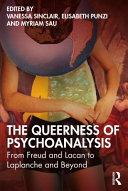[Read] PDF/Book The Queerness of Psychoanalysis: From Freud and Lacan to Laplanche and Beyond
Vanessa Sinclair

Ebook PDF The Queerness of Psychoanalysis: From Freud and Lacan to Laplanche and Beyond | EBOOK ONLINE DOWNLOAD
If you want to download free Ebook, you are in the right place to download Ebook. Ebook/PDF The Queerness of Psychoanalysis: From Freud and Lacan to Laplanche and Beyond DOWNLOAD in English is available for free here
[Download] Link : [Downlload Now] The Queerness of Psychoanalysis: From Freud and Lacan to Laplanche and Beyond
Read More : [Read Now] The Queerness of Psychoanalysis: From Freud and Lacan to Laplanche and Beyond
Description
The Queerness of Psychoanalysis is an exploration of psychoanalysis' often complicated and fraught history with thinking about queerness, as well as its multifaceted heritage. Throughout the chapters, the contributors write about psychoanalysis' relationship with queerness, the ways in which queerness is represented in the psychoanalytic archive and how that archive endures in the present, creating various disruptive effects both within and beyond the clinic. Each chapter from the global cohort of contributors approaches queerness from a different angle: they consider the literary aspects of queerness' presence in the analytic world; the clinical
complexities of working with queer and trans people; metapsychological inclusion and exclusion of queerness, and many other subjects. Taken together, these contributions constitute a decisive intervention into the psychoanalytic canon. They are an unabashed demand for accepting and furthering the representation and inclusion of queer and in particular trans people within psychoanalysis. It is a call for action to utilise and deepen psychoanalysis' enormous explicatory powers and bring together voices that have so far been denied a unity of expression, while critically reevaluating psychoanalysis' historical relationship to queerness. Each chapter proposes different ways of thinking and writing psychoanalytically, with many of the papers queering the format and forms of expression commonly found in academic writing, through their use of dialogues, conversations, or other experimental forms of writing. Written almost exclusively by analysts, scholars and activists who identify as trans and/or queer, this important volume puts theory into practice by centering queer and trans voices.
